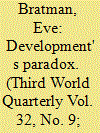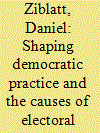| Srl | Item |
| 1 |
ID:
108088


|
|
|
|
|
| Publication |
2011.
|
| Summary/Abstract |
This article examines an urban centre in the heart of the First World through a critical development lens. It contends that traits of the Third World entail certain characteristics which remain consequential as axes of analysis for a variety of economic, political and geographic settings, including new applications in contexts that are typically excluded from the focus of international development practice and scholarship. The article discusses characteristics of 'third worldality' in relation to Washington DC. It posits that, despite being emblematic as a power centre, the city exhibits many of the characteristics of a Third World city. Highlighting disenfranchisement, socioeconomic inequality, and environmental health issues, the article reveals a paradox: underdevelopment in the heart of the 'developed' world. The article calls for greater recognition of the paradoxes of development theory and practice so as to confront persistent problems of orientalism and lack of self-reflexivity in the field of international development.
|
|
|
|
|
|
|
|
|
|
|
|
|
|
|
|
| 2 |
ID:
090821


|
|
|
|
|
| Publication |
2009.
|
| Summary/Abstract |
Why is there so much alleged electoral fraud in new democracies? Most scholarship focuses on the proximate cause of electoral competition. This article proposes a different answer by constructing and analyzing an original data set drawn from the German parliament's own voluminous record of election disputes for every parliamentary election in the life of Imperial Germany (1871-1912) after its adoption of universal male suffrage in 1871. The article analyzes the election of over 5,000 parliamentary seats to identify where and why elections were disputed as a result of "election misconduct." The empirical analysis demonstrates that electoral fraud's incidence is significantly related to a society's level of inequality in landholding, a major source of wealth, power, and prestige in this period. After weighing the importance of two different causal mechanisms, the article concludes that socioeconomic inequality, by making elections endogenous to preexisting social power, can be a major and underappreciated barrier to the long-term process of democratization even after the "choice" of formally democratic rules.
|
|
|
|
|
|
|
|
|
|
|
|
|
|
|
|